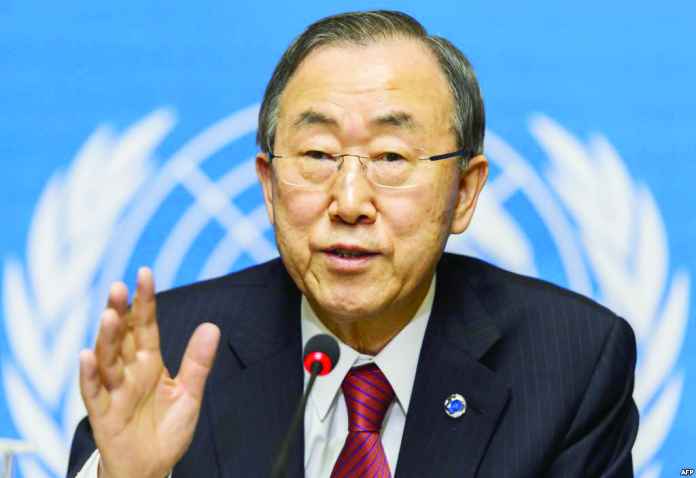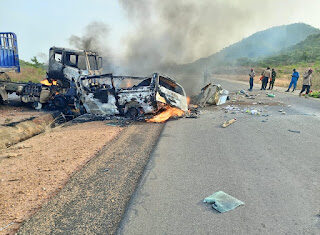As Nigeria joined the rest of the world to observe this year’s World Peace Day last week, pacifists call on agitators in the country to cool their temper, reports Correspondent, SAM NWOKORO
The United Nations (UN) earmarked September 21 for the observance of world peace. It was more a sermon than a decree. The declaration was in effect a symbolic proclamation or emphasis on its fundamental role as the world’s last resort for conflict resolution among member states and between states and non-state actors in any sovereign nation.
Global phenomenon
Absence of peace is a global phenomenon. No part of the world today is exempt from internal political combustion and/or rivalry withanother country. In Africa, Middle East, Europe, Asia, Far East and Australia, the world is increasingly being rattled by various forms of troubles bordering on nationalists’ quest for sovereign autonomy or boundary disputes between neighbouring countries.
The UN has never had it this troubling since the end of the world wars in 1945. The traditional Christian versus Muslim enmity between Israel and her Arab neighbours had taken different and multi-faceted dimensions in terrorism. This is taking a globaldimension, aided by the information super highway that has made communication among terror groups hassle-free.
This has spawned raucous divisions among the once-cohesive brotherhood of the Islamic world. Africa is now contending with jihadists-inspired terrorism, something it never thought of as recently as 1980.Islamic terrorists now desecrate European and western soil with rampant mass murders and suicide bombings, defying the once famed western intelligence, as was the case recently in France, Britain, United States of America and other places thought to be far from their radar.Division for peace
Since the creation of the state of Palestine in 1990, other nations had been agitating for autonomy. With the emergence of new nations such as Southern Sudan, it looks a lot more that UN in the days ahead is going to be contending with the issues of granting some nations autonomy.
Nigeria is currently being rankled by agitations for such. Some want Biafra, some Niger Delta Republic, some Arewa, and some Oduduwa. Some also want Nigeria’s present six political zonal structure form the basis of her federating units and implicitly a new constitution. These agitations have provoked sabotage of Nigeria’s economy and her erstwhile cherished peaceful harmony among the many ethnic groups that formed it.
For the proponents of these ‘divisions’, that is the only recipe for peace.
Each year, the International Day of Peace is observed around the world on September21. The UN General Assembly declared this as a day devoted to strengthening the ideals of peace, both within and among all nations and peoples.
2016 World Peace Day
On September 16, 2016, from9am to 9.30am, the Secretary General Ban Ki-moon celebrated the day in the Peace Garden at the UN Headquarters by ringing the Peace Bell and observing a minute silence. Women Peace Nobel Laureates and the UN Messengers of Peace were invited to participate in the ceremony.
The theme for the 2016 edition, according to the UN scribe, is ‘The Sustainable Development Goals: Building Blocks for Peace’.
At a historic summit of the world leaders in New York in September 2015, the 193 member states of the UN unanimously adopted the 17 Sustainable Development Goals (SDGs). The new ambitious 2030 agenda calls on countries to begin efforts to achieve these goals over the next 15 years. It aims to end poverty, protect the planet and ensure prosperity for all.
SDGs are integral to achieving peace in our time, as development and peace are inter-dependent and mutually reinforcing.
“The 17 Sustainable Development Goals are our shared vision of humanity and a social contract between the world’s leaders and the people,” said Ki-moon. “They are a to-do list for people and planet, and a blueprint for success.
“Sustainability addresses the fundamental needs of the present without compromising the ability of future generations to meet their own needs. Modern challenges of poverty, hunger, diminishing natural resources, water scarcity, social inequality, environmental degradation, diseases, corruption, racism and xenophobia, among others, pose challenges for peace and create fertile grounds for conflict. Sustainable development contributes decisively to dissipation and elimination of these causes of conflict and provides the foundation for a lasting peace. Peace, meanwhile, reinforces the conditions for sustainable development and liberates the resources needed for societies to develop and prosper.
“Every single one of the 17 Sustainable Development Goals is a building block in the global architecture of peace. It is critical that we mobilise means of implementation, including financial resources, technology development and transfer, and capacity-building, as well as the role of partnerships. Everyone has a stake and everyone has a contribution to make,”Ki-moon added.
>>>>
(interview)
Nigerians should imbibe the spirit of peace – Ishola
Lagos State Director of the National Orientation Agency (NOA), a federal government agency charged with preaching the peace gospel in the state, WaheedIshola, spoke to Correspondent, SAM NWOKORO, on the essence of peaceful resolution of Nigeria’s socio-economic problems as well as the grievances of the agitators. Excerpts…
What has the agency been doing to promote inter-ethnic harmony in Lagos?
We have been on it. We have built ‘People of Peace’ advocacy network involving all ethnic nationalities in the state. We hold rallies and regular stakeholders’ meetings with a view to promoting understanding among the ethnic nationalities in the state. It is not a one-off thing. But we hold it from time to time. That is why you observe that there has been low inter-ethnic clashes or social disturbances in this state compared to what obtains in other parts of the country. It is a mechanism we have designed to practically promote understanding among Nigerians. We try to make them understand the need to preach to their subjects not to take laws into their own hands, but to always report issues with potential to cause social unrest to their respective leaders, and that such leaders should regularly interface among themselves. To some extent, it has been helping in the maintenance of law and order in the state.
Some laws in the state tend to work against immigrants.
Laws in Lagos are not targeted against any group. Lagos laws, if you study them carefully, are aimed at saving lives, like those on motorcycle operations, sanitation, building structures etc. You know, Lagos is developing fast as a mega city. And if things are not done orderly, a lot of lives would be wasted. The fact that some sections of the populace dominate some businesses in the state does mean that when laws are made, they are targeted. Of course, those involved and their leaders appreciate that.
What do you tell Nigerians on this year’s World Peace Day?
Nigerians should imbibe the spirit of peace all the time, whether Christian or Muslim, irrespective of your tribe. Nigeria is undergoing economic recession and the government of the day is working hard to bring everything under control. What Nigerians should appreciate is that the present federal government came into power at a time oil price, which has been the major source of our revenue, went far down. So, government is doing its best to diversify and shift emphasis to agriculture and solid mineral exploitation. These sectors have long been under-developed since we have been enjoying the oil money. We have had a lot of portfolio oil merchants that refused to invest on other sectors, and that is what government is now trying to address and to control capital flight, making us have faith in our ability to produce what we need without having to import everything.
Government could not have done anything better differently than it is doing. I think they are on top of the situation. It is not easy to govern. It is easy to criticise, but when you are confronted with details of what has gone wrong, like the rampant corruption and money that has been stolen over the years, you find out that it is not easy to govern when there is insufficient capital to meet targets.
The World Peace Day is aimed at achieving the United Nations Sustainable Development Agenda (SDA). And here we do observe it in variety of ways as our resource can cope, like peace walk, tree planting, and peace advocacy. It is a day of promoting ceasefire. We should understand that no nation can survive with wanton destruction of common heritage because when you do that, you destroy the economy, you destroy the environment, and nobody is gaining. If you kill, you have not done any good nor achieved anything. There should be cessation of all these activities that are inimical to progress, so that our nation can pull through the recession. We can only survive if all our assets are explored to the maximum.
How do you seethe present economic situation in Nigeria?
This government met an economy that was not strong. It came into power when there was no money. It is trying to re-invent agriculture and restore security fully in all parts of the country. Oil produced a lot of portfolio billionaires, but not many Nigerians benefitted.
It is trying to get back all the money that were stolen, and this (anti-corruption war) should be supported. The political will should be supported. That is where we should be able to come back. It has become clear to all of us that we have been living false lives – living beyond our means. But now, most Nigerians are beginning to cut down on waste and luxuries. The government is now trying to bring back that former value system of prudence and thrift, and not extravagance.
Local response to humanitarian crises in the country.
There are various kinds of non-governmental organisations (NGOs). You have also NGI (non-governmental individuals) and other forms. Each works according to its own interest and philosophy on social issues. Some NGOs have tried in providing assistance to the humanitarian and refugee crises, especially the internally-displaced persons (IDPs) in the North East. Some progresseshave been made, but largely piloted by the government-owned Presidential Committee on IDPs. I encourage the NGOs and corporate organisations to assist and emulate people like Dangote who have done much in assisting the IDPs. The issue of humanitarian crises goes beyond tribe and religion. It is a global worry that taunts the conscience of any human being irrespective of who the victim is and who caused it.
Africa’s quest for permanent seat in the UN Security Council.
By the structure of the UN, it has five big permanent members and each of them has power to veto one another. So, there are various interests. Nigeria and Africa must continue pushing, and as Nigeria has grown in stature in the UN since the coming into power of President Muhammadu Buhari because of his pedigree, especially in areas of anti-corruption, I believe, in not-too-distant future, Nigeria can have a permanent seat at the Security Council representing Africa.













